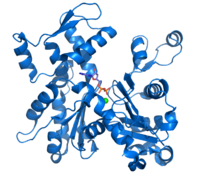
Photo from wikipedia
Metastasis causes death of 90% of cancer patients, so it is the most significant issue associated with cancer disease. Thus, it is no surprise that many researchers are trying to… Click to show full abstract
Metastasis causes death of 90% of cancer patients, so it is the most significant issue associated with cancer disease. Thus, it is no surprise that many researchers are trying to develop drugs targeting or preventing them. The secondary tumour site formation is closely related to phenomena like epithelial-to-mesenchymal and its reverse, mesenchymal-to-epithelial transition. The change of the cells' phenotype to mesenchymal involves the acquisition of migratory potential. Cancer cells movement is possible due to the development of invasive structures like invadopodia, lamellipodia, and filopodia. These changes are dependent on the reorganization of the actin cytoskeleton. In turn, the polymerization and depolymerization of actin are controlled by actin-binding proteins. In many tumour cells, the actin and actin-associated proteins are accumulated in the cell nucleus, suggesting that it may also affect the progression of cancer by regulating gene expression. Once the cancer cell reaches a new habitat it again acquires epithelial features and thus proliferative activity. Targeting of epithelial-to-mesenchymal or/and mesenchymal-to-epithelial transitions through regulation of their main components expression may be a potential solution to the problem of metastasis. This work focuses on the role of these processes in tumour progression and the assessment of therapeutic potential of agents targeting them.
Journal Title: BioMed Research International
Year Published: 2018
Link to full text (if available)
Share on Social Media: Sign Up to like & get
recommendations!